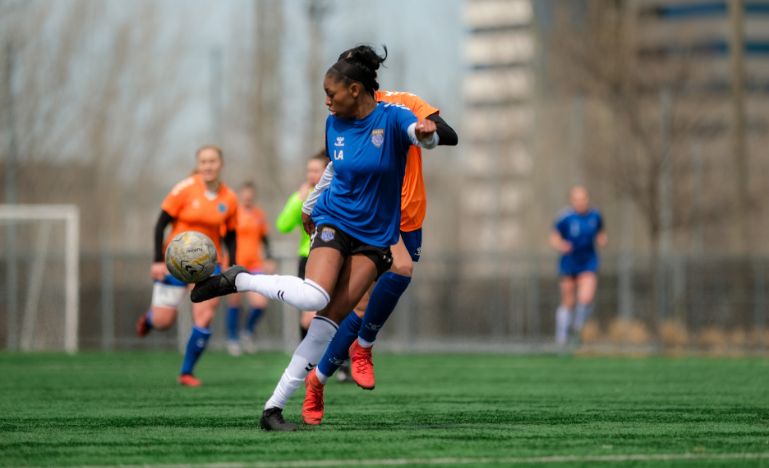Lawyers across the country pitch in to kick off Canada’s first pro women’s soccer league
A love of the beautiful game and small-world connections have brought legal advisers and Northern Super League teams together

When Stephanie Spruston was deciding which law school to attend, it was soccer that tilted her choice towards Queen’s University, where she’d played as an undergrad.
“I stayed at Queens and went to law school at Queens so that I could use my last couple years of eligibility to play soccer,” she says.
In the years since, her career has taken her through many types of law and organizations, but her love of soccer and startups set her up perfectly for her latest role as the chief operating officer of the Ottawa Rapid FC, one of six teams launching Canada’s first professional women’s soccer league on April 16.
Building a professional sports league from the ground up involves endless moving parts, many requiring legal work to help kick things off. A veritable cross-country team of lawyers from a half dozen law firms have been toiling for months to prepare for the Northern Super League’s (NSL) inaugural match at BC Place in Vancouver between the Rise and Calgary Wild FC.

David Palumbo, a partner and chair of the corporate transactions group in Baker McKenzie’s Toronto office, has been working pro bono with the NSL since last summer, when league president Christina Litz, whom he’d known since she worked with the Canadian Football League, asked for an assist.
“That sort of started this big, giant snowball rapidly moving down this ski hill at a rapid, Black Diamond pace,” he says.
Palumbo is also chair of the board at You Can Play, a non-profit that promotes LGBTQ+ inclusion in sports. Through the organization, he met NSL co-founder Diana Matheson and her wife Anastasia Bucsis, a broadcaster and former Olympic speed skater. They connected at a Baker McKenzie event last summer, which led him to contact Litz and ultimately land his pivotal legal role with the league.
Along with a few firm associates, Palumbo has worked on the NSL’s legal structure, governance, and operational support, such as reviewing sponsor agreements and drafting operational manuals and policies. There’s also been plenty of play-focused work, such as developing standard player agreements, compensation policies, maternity and leave policies, as well as player transfer and national team participation rules. As things take off, they’ll provide ongoing strategic support and guidance.
They’re doing the work pro bono to help the league launch successfully.
“My thoughts right now are to continue supporting the league as much as we can without putting a bill in front of them,” he says.

Spruston came to her role with the Ottawa team after 11 years with the Ottawa Sports and Entertainment Group, where she helped bring CFL football back to the capital in 2014. She saw the league getting its legs with good sponsors, partners, and leadership — enough so she was willing to leave her job to take a chance on the burgeoning women’s game.
“When the Rapid came calling in the summer, I had been following along and was super excited about the start of the NSL and really seeing it pick up steam,” she says.
Getting in at the ground level allowed Spruston to exercise her business and legal skills in a role that runs the gamut from leading human resources to managing the business and commercial side of the club. That includes securing facilities, finding partners and sponsorships, reviewing contracts, and handling work permits for international players.

Across the country, Blair Lowther’s volunteer efforts on the boards of Sport BC and the Canadian Soccer Foundation set him up for a shot with the Vancouver Rise. His passion for sports (and sports infrastructure) sparked his desire to be part of the new, emerging organization.
After almost 10 years at Miller Thomson, he was working on his own and initially started on contract as outside counsel for the team. Within a few months, he “started pleading with the president to try and find a way to bring me in on a more permanent, full-time way.”
It ended up being an easy conversation with team president Sinead King, who hired him as general counsel last September — making him one of the first handful of full-time Rise employees.
“It was really exciting to land there,” Lowther says. “Because I came in early and it was a brand new league, I got to participate in [crafting league rules].”
Once those were in place, he was tasked with club business, like finding a home stadium, helping to recruit players and staff, and setting up communications and marketing.
Teams building teams
Most of the teams do not have in-house legal counsel; instead, they rely on external firms, including Fasken, Gowling WLG, Osler, and Blakes, in the launch phase.

As a corporate lawyer and lifelong soccer player, Caitlin Rose, a Montreal partner and co-lead of Fasken’s private equity group, says she was perfectly positioned to help when Montreal Roses FC founders and firm clients Isabèle Chevalier and Jean-François Crevier approached them to help structure the team.
Rose says a large group of Fasken lawyers are involved with the team’s work, which is a combination of paid services and in-kind contributions. As a longtime supporter of sports groups, the firm is a founding sponsor of the Montreal club, and Rose has acquired a small ownership stake in the team.
“We see the parallels between the sporting world and the legal world in terms of the values, the discipline and the good habits that are kind of raised,” she says. “And frankly, the nice lifestyle and giving back to the community.”

Joyce Bernasek, a financial services partner at Osler Hoskin & Harcourt in Toronto, has daughters who play in the same league where the founders of AFC Toronto met. Soccer is a small world, and given her connection to the sport, Bernasek was tapped to help the team launch through one of her clients, who knew one of the team’s founders.
“I was very excited to be part of something from scratch here in Canada for women's professional athletics," she says.
“I think it also resonated with me because we have a big startup program at my firm for emerging companies.”
As is the case with many startup clients, Osler didn’t charge for its advice on everything from AFC Toronto’s incorporation papers and investment documents to intellectual property, contracts, sponsorships, and employment agreements.
“We started out pro bono, and it has shifted as the team has grown and evolved into work that we charge them for,” Bernasek says.

In Calgary, Wild FC board chair Deanna Zumwalt had been Blake Cassels & Graydon partner Scott Clarke's client for years. That meant it was a “no brainer” when she asked him for legal help launching the team.
“It’s pretty exciting to see this transpire, and in terms of our firm, it clearly falls within our vision of doing what we can to support women and girls to pursue excellence,” says Clarke, a corporate-commercial lawyer.
“It was fascinating because, as you would imagine, it's not something you get to do very often, to set up national sporting leagues.”
As the team is among those without in-house counsel, he says Blakes is committed to offering pro bono services for at least the next couple of years.
Back in Ottawa, although Spruston provides in-house legal expertise to the Rapid, she sometimes needs outside help. Enter Martin Lapner, a partner at Gowling WLG, who also happens to be Ottawa Rapid CEO Thomas Gilbert’s cousin. Gilbert reached out early on looking for a local legal partner, and Lapner, a health lawyer, became somewhat of a fixer, connecting the team with lawyers like Jessica Ward, part of the firm’s business law group.
Ward worked with the Rapid on its equity raise, corporate structuring, and negotiating key agreements early on.
“I was a bit of a facilitator,” Lapner says of reaching out to the firm about providing pro bono services.
“There was a lot of interest in helping the team to get off the ground and to support women in sport.”
* The Halifax Tides FC did not respond to requests for comment.


